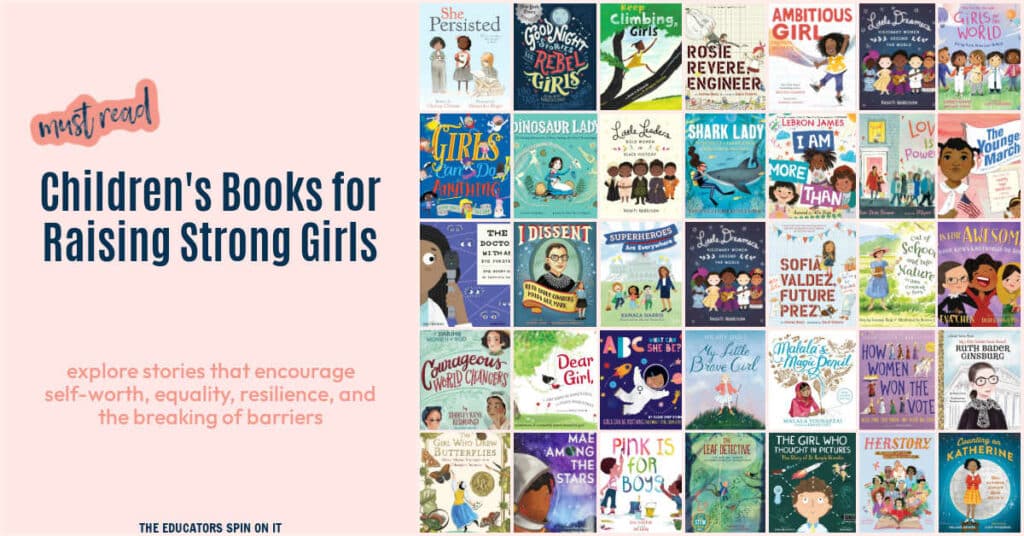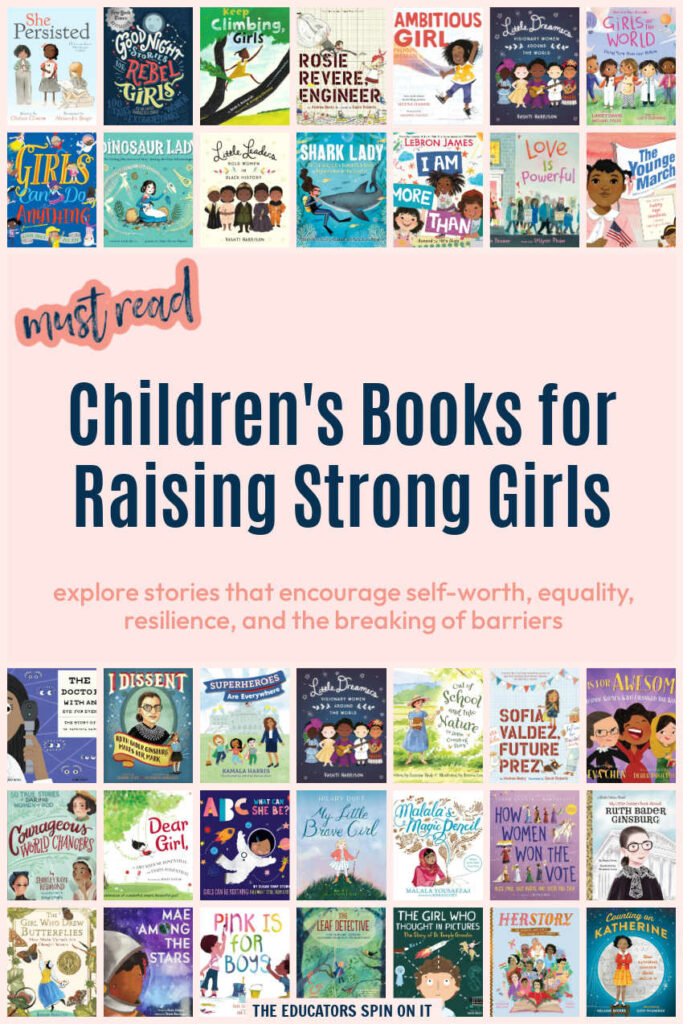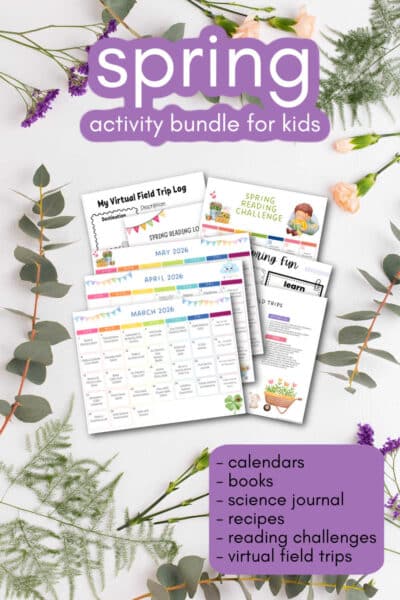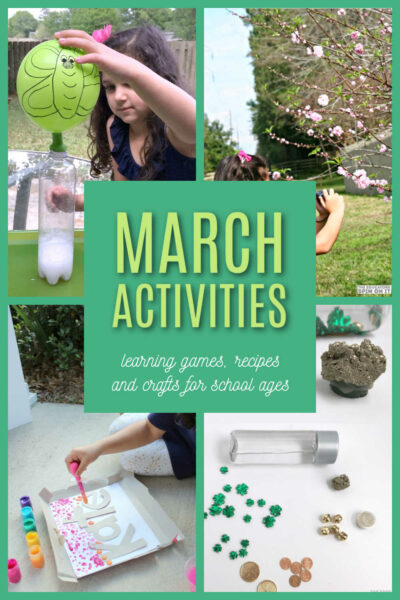Learn about raising strong girls by building their confidence, resilience, and self-worth so they’re ready to handle challenges and negativity. Discover simple, practical ways to empower your daughter today!
In today’s world, even our kids are hearing and experiencing hurtful things at school and in their communities. It’s more important than ever to prepare our daughters to handle these challenges with confidence, strength, and a strong sense of self-worth.
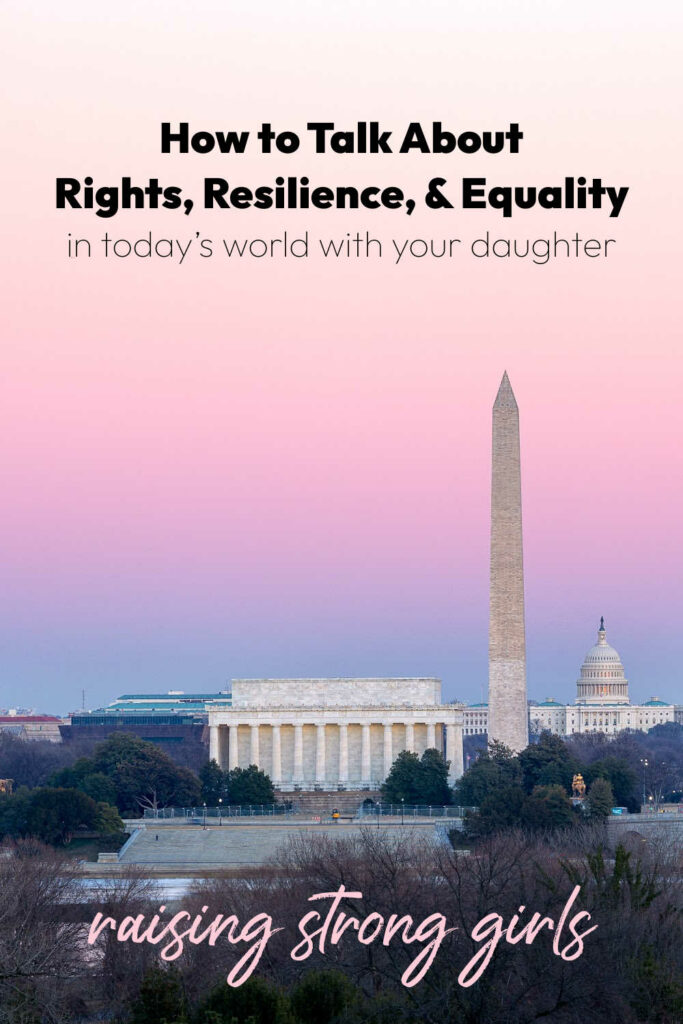
Raising Strong Girls: Navigating Tough Conversations on Rights and Equality
I’ll be honest, the recent election results and the events following have left me in shock…
I’m so sad to share that online abuse, harassment, and hate toward women has soared in the days since the US election.
In the past week, my daughters expressed to me that they now feel unsafe in their very own country, in their own school. I was in shock to hear my daughters have mentioned hearing about the phrase “Your body, my choice” at their middle school and college. I’m livid!
Trying to find the source of this, I did a little research. I discovered an online misogyny trend that started with a viral tweet and video that states “we own your body” by an American far-right political pundit and live streamer who promotes white supremacist, misogynistic, and antisemitic messages. It appears that this has become a thing of some MAGA followers. Both of these are offensive to women and suggest that sexual assault and rape is okay.

Here is some more information on the increased reports of the rise of vocal misogynists online…
- ‘Your body, my choice’: Attacks on women surge on social media following election CNN
- Gen Z boys are telling women ‘Your body, my choice’ after Trump victory Cosmopolitan
- ‘Your body, my choice’: Women report rise in online misogyny following Donald Trump’s victory Independent
- Emboldened By a Trump Win, Misogynists Are Being Loud Online Teen Vogue
- ‘Your body, my choice:’ Women enraged by emboldened MAGA misogynists MSNBC
- Women Report Increased Misogyny Online Post-Election Newsweek
Our kids shouldn’t have to be aware of misogyny, but I’m writing this to remind you to stay alert and be prepared for the conversations you may need to have with your child.

Talking about Gender Equality with Kids
Truth be told, after hearing about this, it seems that gender equality continues to be a topic that we need to discuss with our children often.
Definition for the kids: The equality of women and men is called gender equality. It means that all people, regardless of whether they are male or female, have the same rights, responsibilities, and opportunities.
Discussion Ideas: Everyone deserves to be treated with kindness and respect, whether they are a boy or a girl. Boys and girls can do the same things, have the same dreams, and should have the same opportunities to learn, play, and succeed. It’s important to listen to and support each other, treat everyone fairly, and remember that being different doesn’t make anyone less important or special.

Ways to Teach Gender Equality
- Teach children that everyone deserves equal respect and fairness, regardless of gender.
- Set a good example by using language that doesn’t limit what boys or girls can do.
- Share stories with strong, diverse roles for both girls and boys.
- Talk about people who have made a difference, no matter their gender.
- Help children recognize and question stereotypes they come across.
- Encourage kids to try out any activities they are interested in, without gender expectations.
- Keep conversations open and friendly so they feel comfortable asking questions and sharing ideas.

Empowering Young Girls: Navigating Sensitive Political Discussions with Empathy
Discussing sensitive political issues and rights with young girls can be challenging but is essential for helping them process their feelings and develop an understanding.
Here’s how to approach this with empathy and empowerment:
- Validate Their Feelings: Start by acknowledging any emotions they have, whether they’re confused, angry, or scared. Letting them know it’s okay to feel these things can make the conversation feel safer and more approachable.
- Keep the Language Age-Appropriate: For younger girls, you could frame the discussion around fairness and equality. Explain that sometimes laws are made that can feel unfair to certain groups, and it’s okay to feel upset or want change.
- Empower with Knowledge: Depending on their age, explain the basics of reproductive rights and why they’re essential for health and autonomy. Help them understand that laws may shift but that knowledge and unity empower them to make informed choices about their bodies.
- Explain the Importance of Resilience: Share examples of how people, especially women, have historically stood up for their rights. Encourage them to be resilient and understand that societal change can take time, but it starts with awareness and advocating for what’s right.
- Encourage Involvement and Education: Show them ways they can get involved or educated, even as young people, like learning more about women’s health or reading about inspiring female leaders. Explain that small actions can lead to big changes.
- Instill Hope and Future Action: Remind them that they have a voice, and when they’re old enough, they’ll have a vote. Talk about the power of future generations to shape the world and how they can be a part of positive change.

Empowering Responses for Your Daughter: Handling Disrespectful Comments with Confidence
It’s important for your daughter to feel confident in responding to comments like “your body, my choice,” especially if they make her uncomfortable. Here are some approaches she can consider, depending on the situation and how assertive she wants to be:
- Direct and Confident: “No, my body, my choice.”
This simple statement reaffirms her autonomy. - Questioning: “Why do you think you get to decide for my body?”
This can prompt the boy to reflect on what he said and why it’s problematic. - Humorous but Assertive: “You must be confused—my body comes with its own management team.”
Humor can defuse the situation while making a clear point. - Educative: “Comments like that reflect outdated and harmful thinking. I hope you can understand how serious bodily autonomy is.”
If she feels safe and prepared, she can use the opportunity to educate. - Firmly Dismissive: “That’s not funny or clever, and I’m not interested in hearing it.”
She can make it clear that the comment is unwelcome.
Encourage her to use the approach that makes her feel the safest and most comfortable. It’s also helpful to discuss why such statements are wrong, so she feels equipped to respond both emotionally and intellectually.
I told my daughters it might be easier just to come up with a phrase you use when you feel what’s being said to them is inappropriate. Simple terms like “stop”, “excuse me” or “what did you just say” are a few that come to mind.
As parents and teachers, we need to be prepared for our children to experience one or more of the four Trauma Responses in these types of situations. Fight, flight, freeze, and fawn are all common stress responses to threats. This Brain Basics video shows a simplified version of why our bodies do this.
Here are some additional resources to help you if your child is being approached inappropriately:
- Stop Bullying shares this Get Help Now resource with helpful information for kids & parents.
- Anti Bullying Alliance shares some helpful information about Preventing Sexual and Sexist Bullying.
- STOMP Out Bullying has info on What Kids And Teens Can Do About Sexual Harassment.
- The Monique Burr Foundation for Children shares resources for How to End Bullying with School Programs.

Raising Strong Girls
In our family, we’re raising Rebel Girls! We want to empower our girls to dream big and to know that girls can and should do everything! We’re not alone, there are over 35 million self-identified Rebel Girls from more than 115 countries. A Mighty Girl has shown us that girls do not have to be relegated to the role of sidekick or damsel in distress; they can be the leaders, the heroes, the champions that save the day, find the cure, and go on the adventure.
The truth is, not everyone shares this core value. It’s important to keep the conversation open with our kids so they feel comfortable discussing what they experience in their daily lives or see on the shows they watch. As children grow, their exposure to different people and ideas increases, especially when they join teams, clubs, or social media platforms. Remind them that if anything ever makes them feel uncomfortable, they should always go to the trusted adults in charge.
To keep the conversation open, we encourage our children to share one high, one low, and one act of kindness each night at dinner. If life gets busy, the car ride home from school or on the way to a practice works well too.
Must-Read Books for Raising Strong Girls
It’s more important than ever to inspire our daughters and young readers with stories that celebrate courage, equality, and the power of dreams. Take a moment to look over this Children’s Book List for Raising Strong Girls. It shares so many empowering stories about extraordinary girls and women who have made a difference, along with stories that encourage self-worth, resilience, and the breaking of barriers.

Raising strong, resilient girls means having honest conversations, giving them the tools to stand up for themselves, and reminding them of their power and worth. Together, we can help our daughters feel confident and supported, no matter what challenges they face.
Let’s keep listening, learning, and empowering them to make a positive impact in the world.
You may also find these helpful…

